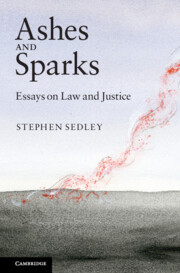Book contents
- Frontmatter
- Contents
- Preface
- Acknowledgements
- PART I History
- PART II Law
- PART III Justice
- 24 The right to know
- 25 The moral economy of judicial review
- 26 Policy and law
- 27 Responsibility and the law
- 28 The Crown in its own courts
- 29 Human rights – who needs them?
- 30 Fundamental values – but which?
- 31 Overcoming pragmatism
- 32 Sex, libels and video-surveillance
- 33 This beats me
- 34 Public inquiries: a cure or a disease?
- 35 Human rights: a twenty-first century agenda
- 36 Are human rights universal, and does it matter?
- 37 Bringing rights home: time to start a family?
- 38 The four wise monkeys visit the marketplace of ideas
- Index
27 - Responsibility and the law
Published online by Cambridge University Press: 05 June 2012
- Frontmatter
- Contents
- Preface
- Acknowledgements
- PART I History
- PART II Law
- PART III Justice
- 24 The right to know
- 25 The moral economy of judicial review
- 26 Policy and law
- 27 Responsibility and the law
- 28 The Crown in its own courts
- 29 Human rights – who needs them?
- 30 Fundamental values – but which?
- 31 Overcoming pragmatism
- 32 Sex, libels and video-surveillance
- 33 This beats me
- 34 Public inquiries: a cure or a disease?
- 35 Human rights: a twenty-first century agenda
- 36 Are human rights universal, and does it matter?
- 37 Bringing rights home: time to start a family?
- 38 The four wise monkeys visit the marketplace of ideas
- Index
Summary
In 2002 I was invited to contribute a paper to a symposium on science and human agency organised by the Royal Society and Gresham College. The event brought together papers from an interesting range of disciplines, collected in book form as The New Brain Sciences: Perils and Prospects (Cambridge University Press, 2004). I don't know how much this paper added to the sum of knowledge, but the other papers added a great deal to mine.
When a defendant claims in an English court that his offence was not murder but manslaughter by reason of diminished responsibility, the judge has to explain to the jury that:
Where a person kills or is party to the killing of another, he shall not be convicted of murder if he was suffering from such abnormality of mind (whether arising from a condition of arrested or retarded development of mind or any inherent causes or induced by disease or injury) as substantially impaired his mental responsibility for his acts or omissions in doing or being party to the killing.
This provision was introduced into the law of England and Wales by Act of Parliament in 1957. It had by then been part of the judge-made law of Scotland for many years. Both jurisdictions had also for centuries reduced murder to manslaughter in cases of provocation.
- Type
- Chapter
- Information
- Ashes and SparksEssays On Law and Justice, pp. 263 - 268Publisher: Cambridge University PressPrint publication year: 2011



